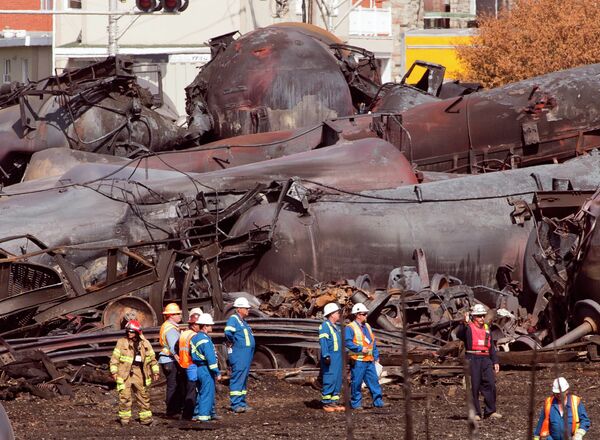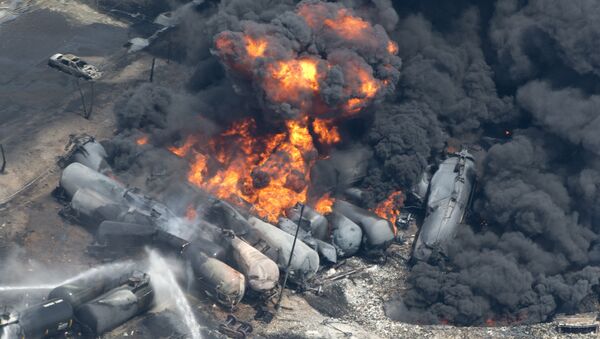Jurors are being selected this week for a trial in Canada which could have huge consequences for the railroad industry across North America.
Train driver Tom Harding, railway traffic controller Richard Labrie and manager of train operations Jean Demaitre have all been charged with 47 counts of criminal negligence causing death and are due to go on trial this month.
But Fritz Edler, a special representative at Rail Workers United, believes they have been made into scapegoats when the real causes of the disaster go much deeper.

"Charging only some of the people who worked there and not the people who made those policies means there will never be accountability and there will never be safety coming out of it," Mr. Edler told Sputnik.
In the early hours of July 6, 2013 a train pulling 74 cars full of oil derailed in the small town of Lac-Megantic in Quebec and blew up killing 47 people.
'Potential Profitability'
Mr. Edler said what was really to blame for the disaster at Lac-Megantic was the deregulation of the railroad industry which had allowed "rail barons" to cut staffing to the bone and cut corners with maintenance and safety standards in order to make more money.
The oil train was operated by the Montreal, Maine & Atlantic Railway (MMA), which went bankrupt a few months later under the weight of the millions of pounds in damages and compensation it faced as a result of the disaster.
"Once MMA had figured out the potential profitability of running these unit trains with oil they started increasing the size of them," said Mr. Edler, who is also head of the Harding-Labrie Defense Committee.
He said eventually the trains became too long to park them safely in a siding west of Lac-Megantic and instead they began parking them on a slope at Nantes, seven miles outside of town.
MMA was owned by Rail World Inc, a US company owned by Ed Burkhardt, who has twice been lauded as Railroader Of the Year by the industry.
MMA had also cut costs by reducing staffing so that a single person — in this case Mr. Harding — was responsible for the locomotive and its 74 cars.
Night of the Disaster
On the night in question Mr. Harding — who was working on his day off — was instructed to keep the locomotive engine on and leave it parked, held by its airbrakes and a handbrake, while he went to a hotel to catch a few hours' sleep.
Then a fire broke out on the locomotive and was put out by local firemen who shut down the locomotive and called MMA.
"Then the MMA dispatcher called Harding… and Harding says 'do you want me to go out and check?'…and they told him 'no, we got this'. So he went back to sleep," Mr. Edler told Sputnik.
Tears, exemptions as jury selection gets underway in Lac-Mégantic rail disaster trial https://t.co/yHMlhYh6yC pic.twitter.com/4L6Pasw6g4
— The National (@CBCTheNational) 11 September 2017
But because the locomotive had been shut down the airbrakes failed and the handbrake was unable to hold the 74-car convoy in place. At 1am the train started rolling and 15 minutes later it derailed on the bend in the center of downtown Lac-Megantic and caught fire.
Thirty of those who died were enjoying a night out at the Musi-Cafe bar, including Genevieve Breton, 28, an aspiring singer and performer.
"I was at home and my house is about 1,000 feet from the track. The train was like a machine gun passing. It was really loud. My house is on a straight line but a quarter of a mile away is where it exploded. It was like a series of small bombs and then during the night there were two big bombs and big orange mushroom clouds," Andre Blais, who is now a member of the Lac-Megantic Rail Safety Coalition, told Sputnik.
He believes MMA put profits before people.
Courthouse is so full that journalists have been asked to sit on the bench usually reserved for the accused… #MeganticTrial #CBC
— Claude Rivest (@clauderivest) 11 September 2017
"Lac-Mégantic is a town of 5,500 people and two-thirds of the people have Post-Traumatic Stress Disorder. Another 300 or 400 have left altogether. Downtown is like a desert," Mr. Blais told Sputnik.
One juror just broke down crying, saying she knew most victims and her spouse lived in the "red zone". "Exemptée," said Justice Dumas.
— Claude Rivest (@clauderivest) 11 September 2017
He said he blamed the Conservative government under Prime Minister Stephen Harper for deregulating the rail industry too much, but said the Liberals under Justin Trudeau had also failed to do enough to improve rail safety and he said there had been derailments in Ontario and other parts of Canada since the Lac-Megantic disaster.
The Lac-Megantic Rail Safety Coalition is pushing for a rail bypass to be built so that trains would no longer pass through the town at all.
One thing stands out: many francophones are not confident in their capacity to understand technical aspects of this trial in English.
— Claude Rivest (@clauderivest) 11 September 2017
'It's Your Train That Rolled Down'
On Monday, September 1, Quebec Superior Court Judge Gaetan Dumas began selecting jurors for the trial of Mr. Harding and his co-accused.
One woman was excused from jury service after she broke down crying and said she personally knew many of the victims of the crash.
The trial is being held in the town of Sherbrooke and the judge has said he wants a bilingual jury because the trial will be held in both English and French — the language of Quebec — and while Harding can only speak English, Labrie and Demaitre are French-speakers.
The jury will be asked to listen to extensive audio tapes of conversations Harding had with his dispatcher back at MMA's head office.
In one excerpt the dispatcher, identified to only as RJ, has to break the bad news to Harding, who had rung up from his hotel at around 3am.
"Okay, but it's worse than that, my friend," says RJ.
"Why?" asks Harding.
"It's your train that rolled down," RJ tells him.
"No, RJ," he replies.
"Yes, sir," says RJ solemnly.
"Holy f***…..she was f***ing secure…. How the f*** did that thing start to roll down, RJ?" says Harding.
'Proper Public Inquiry Is Needed'
The trial is expected to last until December but many people in Lac-Megantic and across North America are hoping Mr. Trudeau will call a public inquiry afterwards to examine the wider implications.
"What is really needed is a proper public inquiry which brought this wreck about since it is broadly understood that this wreck was inevitable, given the kind of policy decisions that were taking place on the ground…I have always called it a wreck because it wasn't an accident," Mr. Edler told Sputnik.
He said he feared that another disaster like Lac-Megantic might happen in another town in the US or Canada because the railroad industry continued to try and push down costs.
"The railroad industry is aggressively pushing the envelope for single crew operations, they are pushing the envelope for more and more of these volatile oils being carried in equipment which has been shown to be inadequate to protect them, and now they are even pushing for trains with no crews whatsoever," Mr. Edler told Sputnik.


